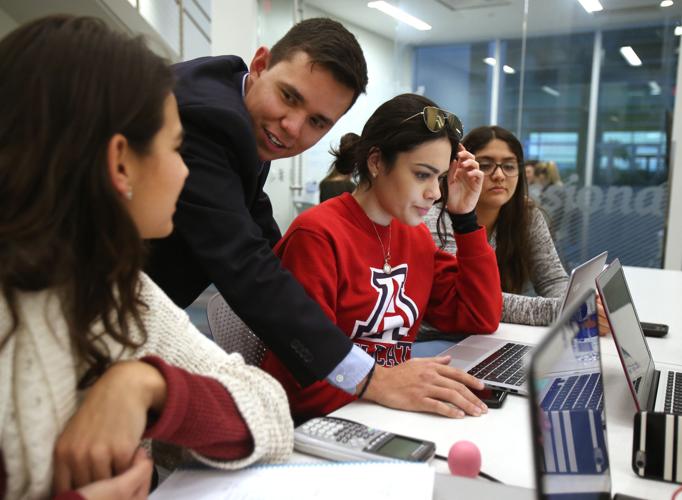Arizona college students are increasingly choosing business and health-related majors, but not so much education, history or architecture.
A new report by the Arizona Board of Regents showed that in the 2015-2016 school year, there was an overall growth in the number of degrees awarded by the state’s three public universities, both at the undergraduate and graduate levels.
Among the findings were:
- The state university system awarded about 9,000 undergraduate and 3,600 graduate degrees more than 10 years ago;
- Arizona State University awards more than half of the state’s degrees. It gave 55.6 percent of more than 27,000 undergraduate and 60.8 percent of nearly 11,000 graduate degrees;
- The University of Arizona awards 25.9 percent of the state’s degrees with 9,973 total (7,089 undergraduate at 2,884 graduate); and
- At the undergraduate level statewide, business and marketing degrees saw the highest growth. For the graduate level, it was engineering.
At the University of Arizona, the majors that awarded the most degrees were business, health-related, biological or biomedical sciences, social sciences and engineering.
“Students are making choices and looking at where there are job opportunities and choosing those majors,” said Dan Anderson, director of institutional analysis for the regents board. The largest increases in the number of degrees awarded follow job market trends.
On the other hand, education saw steep declines statewide in the number of degrees awarded both at the undergraduate and graduate levels.
While it still remains one of the largest majors at each of the three state universities, statewide there were 587 fewer education bachelor’s degrees awarded in 2015-2016 school year compared with the 2007-2008 school year.
But there are teacher jobs all around the state. Scores of research conducted by the Arizona Department of Education and education-advocacy organizations around the state point out a growing teacher shortage in Arizona. Tucson-area school districts started out the 2016-2017 school year with hundreds of teacher vacancies.
One important distinction is that most of the decreases in education degrees come from degree tracks that lead to becoming a teacher, said Ronald Marx, professor of education psychology and dean of education at the UA. In other words, students aspire to be in education; they just don’t want to become teachers.
In fact, program areas in the College of Education other than teacher certification tend to be very robust, he said. Aside from the obvious low-wage issues — starting Arizona teachers tend to make about $30,000 to $35,000, though the amount varies across the state — Marx said the reputation of teaching as a profession has taken a beating.
Teachers are increasingly depicted in mass media as being not particularly smart, effective nor caring, he said. Teaching has come to be considered a low-status profession in the past several years.
“Low social status and low amounts of money compounds into fewer people making decisions to be teachers,” Marx said.
Then there is the issue of low return on investment, he said.
Tuition at public universities across the country is skyrocketing, but teacher wages in the state are so low that many students, even those with passion, can’t justify graduating with a degree loaded with debt just to get a job that doesn’t provide them the ability to pay that debt off.
In contrast to education, business majors often see a high return of investment, said Pam Perry, associate dean of undergraduate studies at the Eller College of Management at the UA. Eller’s Masters in Business Administration program was ranked sixth in the country recently for return on investment by U.S. News & World Report.
“Business has always been one of the most-popular majors at almost every major university,” she said. The Board of Regents report noted the high growth of business-management and marketing degrees, but that growth isn’t necessarily a surprise to the associate dean.
Perhaps a more noteworthy finding from the report would be that health-related degrees have also seen a big hike, Perry said.
Francisco Moreno, assistant vice president for diversity and inclusion at UA Health Sciences, said health-related professions have also always enjoyed a high level of interest from students, but added that the interest has increased significantly in the last several years.
Statewide, nearly 1,200 more health-related undergraduate degrees were awarded in 2015-2016 school year than eight years ago. At the graduate level, the number of degrees awarded went from 551 to 1,251.
The UA’s health-sciences programs serve more than 9,000 undergraduate students, Moreno said. The health industry has steadily been a reliable source of employment for graduates. “The spectrum of healthcare services is pretty much under-resourced in terms of human capital,” he said.
What aids in UA health programs’ growth is the industry’s growth in the community, he said. It’s a mutually beneficial relationship, with the university supporting the establishment and development of medical and biotechnology firms in the area and those firms looking for employees at the university.
An example of that relationship is Ventana Medical Systems, which makes medical diagnostic instruments. It’s a homegrown firm, still manufacturing in Tucson and distributing worldwide. Ventana was born with the help of the UA and former UA President Henry Koffler.
The Health Science Center also collaborates with local school districts and nonprofit organizations to develop outreach and education programs. Those connections are “good forms of recruitment,” Moreno said.





